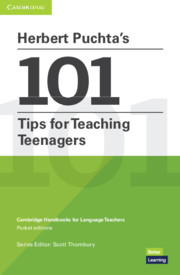 Herbert Puchta's 101 Tips for Teaching Teenagers
Herbert Puchta's 101 Tips for Teaching Teenagers Book contents
I - Fostering Maturity
Published online by Cambridge University Press: 28 October 2023
Summary
Despite the fact that teens tend to mature physically at a younger age than they used to, their mental maturity lags way behind. Research shows that the development of the so-called frontal lobe of the neocortex – that is, the structure in the brain required for higher-order thinking, decision making, critical thinking and the willingness to take responsibility for oneself and others – tends to be delayed into their twenties or later. Further, many teens depend heavily on digital social media that can so often create a deceptive sense of accomplishment in them. The tips in this section include ones that will help teens to set realistic goals for themselves and learn to be persistent, defeat procrastination, develop a growth mindset and use efficient study strategies; in short, to work towards becoming responsible adults.
93 Help learners to set goals and reach them
94 Help learners become responsible adults
95 Help learners beat procrastination
96 Inspire learners to become high achievers
97 Deriving pride from effort – and learning from mistakes
98 Coach body language clusters
99 Help learners develop growth mindsets
100 Teach efficient study strategies
101 Help your learners be happy learners
93 Help learners to set goals and reach them
When we ask learners to set goals, they will often do so quite enthusiastically. However, most learners tend to forget about them when they come up against obstacles.
In order to help learners retain their vision of those goals, try these ideas:
• Write or project a text with keywords learners might need in order to talk about their goals, in, e.g. vocabulary, pronunciation, reading, listening, speaking, writing, preparing for exams, studying for tests, getting good grades, etc.
• Give learners an example of a goal and concrete action steps. For example, Goal: I will increase my knowledge of vocabulary. Action steps: Every day we have English, I’ll take five minutes to go over new language I have learnt that day, and another 10 to revise language previously learnt. I’ll do that for two weeks, starting dd/mm. Ask learners to work in groups and define more goals and action steps. Help them phrase these well, and write them on the board. Ask all learners to note them down.
• Tell learners to write down examples of what a learner might get out of achieving a goal, e.g. My parents will allow me to spend more time with my friends.
- Type
- Chapter
- Information
- Herbert Puchta's 101 Tips for Teaching TeenagersCambridge Handbooks for Language Teachers Pocket editions, pp. 101 - 110Publisher: Cambridge University PressPrint publication year: 2020


